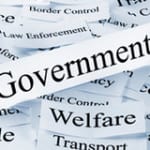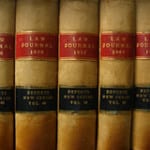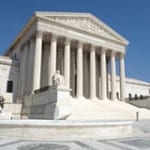
In Human Rights Backsliding, co-authors Andrew Guzman and Katerina Linos question the idea that international human rights norms always lead to greater protections. Although effective in moderate democracies, they say such norms may lead to fewer protections, not more, in stable democracies.

In Climate Policy in a System of Divided Powers, Professor Dan Farber argues that states and the executive branch can act on environmental mitigation efforts in place of a deadlocked Congress. Farber looks at the constitutional issues in areas where “the Supreme Court has not been a model of clarity.”

Urban water systems are in decline. But Berkeley Law’s Michael Kiparsky says that technology is only part of the solution. A new article he co-authored says engineers must first understand the cultural, economic, and political mechanisms that both hinder and enable innovation.

China has created 95 environmental courts since 2007, but prosecutors are suing low-level rule-breakers far more than major polluters, a new study by faculty member Rachel Stern shows. Stern found that most offenses stem from poverty, mistake, or bad luckÂand that most defendants lack education and legal representation.

Professor Paul Schwartz proposes a way to bridge the gap between U.S. and E.U. privacy laws. In Reconciling Personal Information, Schwartz and his co-author argue for a tiered approach to “personally identifiable information” that’s consistent with the principles of both regimes.

Ty Alper thinks the Supreme Court is moving closer to recognizing a right of noncapital defendants to raise claims of ineffective trial counsel. In a recent paper, Alper argues that this development vindicates the bedrock principle embodied in Gideon v. Wainwright.

A new International Human Rights Law Clinic report lays the groundwork for legal reform to combat sexual violence against men during armed conflict. Using Uganda as a case study, the report examines legal remedies and touts international criminal justice as the best vehicle for progress.

In The Democratic Foundations of Policy Diffusion, Katerina Linos offers a new theory of how legal reforms spread worldwide. It’s not elite technocrats that instigate change, Linos says, but citizens, political leaders, and NGOs. Read more on the Opinio Juris symposium.

Tax expert David Gamage writes that key reforms are needed to prevent Obamacare from hurting low- and moderate-income workers. If not, he says businesses may shift some full-time workers to part-time and cut their salaries to circumvent the employer mandates.

Professor Stephen Sugarman analyzes scholarships funded by state tax credits that allow low- and modest-income families to send children to private schools in grades K-12. The article, which also compares such scholarships to voucher plans, will appear in the Journal of Law and Education.

Assistant Professor Andrew Bradt’s recent paper analyzes multidistrict litigation. This legal area is exploding, due largely to U.S. Supreme Court decisions limiting class action suits. But Bradt says lawyers need to understand “choice-of-law” rules for each claim, or risk jeopardizing their client’s case.

Assistant Professor Karen Tani’s research explores the legal backbone of the U.S. welfare state. She won a Hellman Fund award for her project on welfare, rights, and governance; and a related article “Welfare and Rights Before the Movement” recently appeared in the Yale Law Journal.

A leading national survey has named Professor Robert Bartlett’s article, Making Banks Transparent, one of the top ten corporate and securities law articles of 2012. Bartlett argues that basic credit risk modeling combined with mandatory bank disclosures would help prevent another round of severe banking crises.

In The Problem of Environmental Monitoring, Professor Eric Biber critiques the way agencies collect and analyze data about our natural environs. He argues that the practice, although critical to the development of environmental laws and regulations, is inherently flawed. The article will appear in the Land Use and Environmental Law Review.

Melissa Murray’s prize-winning paper What’s So New About the New Illegitimacy debunks the idea of an improved legal climate for out-of-wedlock births. If anything, illegitimacy is making a political comeback. Liberals call it an injury forced upon kids of same-sex couples, but Murray warns against using it as an argument for marriage equality.

In an article, Industry self-governance: A new way to manage dangerous technologies, co-author Stephen Maurer suggests that private firms can often regulate the sale and purchase of chemical, biological and nuclear weapons more effectively than governments. He says treaties to regulate this trade take too long to create and often go unenforced.

An article by Kate Jastram examines the legal plight of Haitian children whose dangerous escape by sea from their impoverished homeland ended in military custody on Guantanamo. Jastram argues that it was the Haitian refugees’ legal struggles that set the stage for the post-9/11 litigation over what rights, if any, could be claimed by non-U.S. citizens held there.

An article by Kenneth Bamberger and Deirdre Mulligan, PIA Requirements and Privacy Decision-Making in US Government Agencies, has been cited as one of the best works of recent scholarship relating to corporate law. The professors examine tensions between the bureaucratic drive for security and efficiency versus the need to comply with privacy regulations.

Contrary to popular belief, Professor David Sklansky argues that evidentiary jury instructions probably do work, albeit imperfectly. In a law review article, he suggests studying when they’re most likely to failÂand how to improve them. He also says we need to accept that juries are not common oracles, but flawed groups of people capable of reason.

Professor Harry Scheiber is the editor of Regions, Institutions, and Law of the Sea: Studies in Ocean Governance. This publication of papers from the Law of the Sea Institute’s international conference in Seoul, Korea includes a timely analysis of laws involving piracy, geo-engineering, shipping operations, and more.

Assistant Professor Rachel Stern’s new book, Environmental Litigation in China, seeks the improbable: legal relief for pollution in a country known for tight political control. Stern argues that litigation can contribute to social change in China and support a nascent environmentalism.

Professor Pamela Samuelson examines a ”troublesome” phrase within the Copyright Act that limits derivativescreative works based on pre-existing material. In a journal article, she argues that the act was designed to reduce, not expand, protections of original works in an effort to promote innovation and competition.

A new paper by Professor Richard Buxbaum takes a fresh look at reparations through a seminal event: payments for World War II atrocities. Buxbaum says the failure of states to negotiate just compensation for victims of that war has led to individual claims filed under the umbrella of international human rights law.

A report by Berkeley Law’s Human Rights Center describes how hi-tech tools and science can advance criminal investigations and prosecutions at the International Criminal Court. Beyond Reasonable Doubt stems from a workshop at The Hague on the use of DNA analysis, remote sensing, digital evidence, and more.

In his paper, How Democracy in Arab States Can Benefit the West, Jamie O’Connell says emerging democratic Arab nations could reduce the risk of terrorist attacks and bolster economic alliances. O’Connell urges the West to study the nuances of individual Arab states and the preferences of their citizens.

Nearly half of all U.S. university or college students fail to graduate within six years. A new report by a coalition of national leaders, including Berkeley Law Dean Christopher Edley, Jr., recommends a solution: overhauling financial aid programs to increase higher-ed access, affordability, and completion.

JSP Program scholars are emerging as influential thought leaders in socio-legal theory. The new issue of Law & Society Review features articles by student Ashley Rubin and Lynette Chua ’11, reviews of books authored by Kaaryn Gustafson ’97 and Chrysanthi Leon ’06, and book reviews by Hadar Aviram ’05 and Tom Ginsburg ’97.

In his latest article, Assistant Professor Stavros Gadinis describes how the 2007-08 worldwide economic crisis has led to greater political oversight of independent financial institutions. But he warns that such involvement by elected politicians might actually endanger international financial markets, not stabilize them.

In an article on China’s environmental protection efforts, Professor Alex Wang says the regime’s primary focus is economic growth and stabilityÂnot true reform. Wang believes greater public supervision is vital to prevent bureaucrats from routinely falsifying information and shutting down pollution controls.

The fair use doctrine allows limited use of copyrighted material, but artists are wary of its inherent uncertainty and the harsh penalties for copyright infringement. Professor Peter Menell proposes a fee-shifting solution that clarifies usage rights and offers incentives to resolve disputes quickly.

A new study by Professor Justin McCrary suggests that U.S. cities may want to hire more cops. McCrary found that every dollar spent on police reduces victimization costs by about $1.60. The data also show that police are more effective at reducing violent crime than property crime.

The 2011 America Invents Act (AIA) revamped some key rules in the U.S. patent system. In Priority and Novelty Under the AIA, Professor Robert Merges describes the seismic shift from “first-to-invent” to “first-to-file” and helps patent applicants navigate the new legal landscape.

In The Forgotten Core Meaning of the Suspension Clause, Professor Amanda Tyler explores the historical record to determine what our country’s founders meant by the Writ of Habeas Corpus. Her findings call into question the constitutionality of detaining U.S. citizens as so-called “enemy combatants” in the wake of 9/11.

The National Security Agency illegally tracks the electronic communications of millions of innocent Americans, according to an amicus brief filed by the Samuelson Clinic. Countering claims that litigation would reveal state secrets, the brief refers to existing procedures for reviewing sensitive evidence.

A new study led by Taeku Lee shows that Asian-American voters favor Barack Obama over Mitt Romney 43% to 24%, but nearly one-third are undecided. This cohort could be a potent voting bloc: the Asian-American population grew faster than any other group (46%) between 2000 and 2010, and one in six lives in a swing state.

Senior Fellow Richard Rothstein disputes an argument by educator Joel Klein that poverty has little to do with poor school performance. Rothstein’s new article points out that Klein, who cites his childhood in “public housing” as proof, actually grew up in projects that were restricted to middle-class families.

A study of consumer attitudes by Chris Hoofnagle, Jennifer Urban, and Su Li finds that most Americans oppose any collection of data about their online activities. The Berkeley Law trio fault both the ad industry’s proposed self-regulatory guidelines and the federal “Do Not Track” proposal. Read the New York Times story here.Â

Assistant Professor Stavros Gadinis’ study of SEC enforcement actions against broker-dealers is getting national attention. Results from the first such systematic examination in 30 years reveals that size matters. Larger firms fare better than smaller ones, which face tougher SEC sanctions.Â

An article co-written by Professor Victoria Plaut argues that our sense of well-being is influenced markedly by our home city. In studies comparing San Francisco and Boston, she finds that San Franciscans value innovation and egalitarianism, while Bostonians prioritize tradition, community, and tighter social norms.

A new study by Professor Eric Biber finds that public citizens are better at pinpointing endangered species than the Fish and Wildlife Service. A Science magazine article co-written by Biber about the study caught the attention of the New York Times, which published an editorial on the topic.

Cops typically arrest and jail criminals; they rarely help released prisoners navigate the return home. But a paper co-authored by Sarah Lawrence, a director at Berkeley Law’s Warren Institute, says an active police role in prisoner reentry could help reduce crime and recidivism in poor communities.

Legal services programs help more than one million low-income clients annually, yet scant evidence exists about their efficacy. In a new Yale Law Journal essay, clinical law professor Jeffrey Selbin calls for empirical research to help improve and expand the delivery of legal services to clients in need.

The Yale-Harvard-Stanford Junior Faculty Forum selected Asst. Prof. Bertrall Ross’s new paper to discuss at its recent annual conference. Ross argues that the Supreme Court uses nuanced standards to assess whether electoral laws dilute racial minorities’ votes, even though equal protection claims require proof of intentional discrimination.

African Americans make up 14 percent of the U.S. population, but 44 percent of those who are HIV-positive, while Latinos have triple the infection rate of whites. In a new paper, co-author Russell Robinson says structural inequities, not high-risk behavior, create the wide disparities in rates and outcomes of minorities with HIV/AIDS.

Residential buildings account for about 20 percent of U.S. greenhouse gas emissions. A new report by Lori Bamberger, senior fellow at the Berkeley Center for Law and Business, lays out a plan for significantly increasing the pace of energy efficiency efforts in California’s existing single-family homes.

A new national survey by Berkeley Law’s Jennifer Urban ’00, Chris Hoofnagle, and Su Li found that Americans overwhelmingly consider information stored on mobile phones to be private. The vast majority of about 1,200 adults surveyed also rejected collection of mobile phone data for coupons, ads, telemarketing, and more.

A new report by the International Human Rights Law Clinic, Sexual Diversity in El Salvador, finds rampant abuse and discrimination against the LGBT community. Written by Clinical Instructor Allison Davenport, the report recommends stronger legal protections for that country’s transgender individuals.
The 100 most popular websites track their users online, and reliable ways to measure this activity are vital as policymakers confront consumer privacy concerns. A new Web Privacy Census, co-developed by Berkeley Law’s Christopher Hoofnagle, attempts to do just that, by measuring online tracking over time.

In a new paper, American Youth ViolenceÂA Cautionary Tale, Professor Franklin Zimring examines criminal trends since 1975 and finds catastrophic errors in juvenile crime projections. He argues that adolescent violence has arrived at a “new normal” and that the volatile swings of the ’80s and ’90s are over.

A new report by Berkeley Law’s Chief Justice Earl Warren Institute on Law and Social Policy gives failing marks to California’s continuation high schools. Designed to help at-risk students, the schools too often serve as “dumping grounds” for disruptive teens.